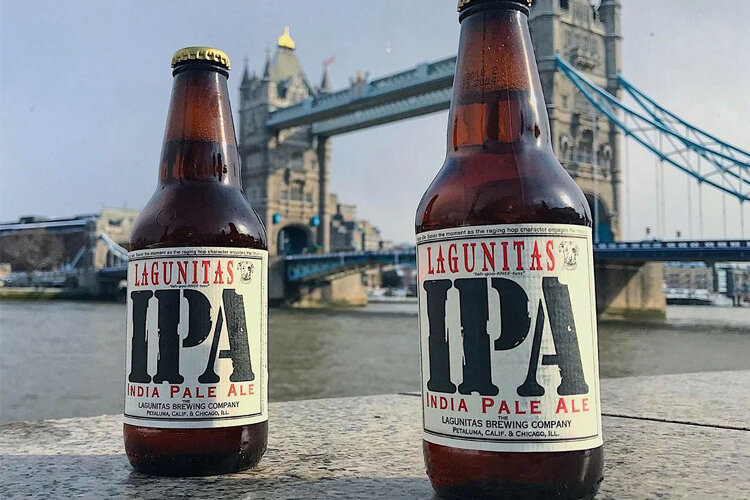THE GIST
The sudden and surprise closure of Lagunitas Brewing Company's Community Room taproom in Portland, Oregon last week underscores broader challenges the business faces, both in regards to sales plans and execution in a tightening U.S. market.
As first reported by The New School, all employees were laid off with severance, and about 40 events that were set to be hosted through the end of 2019 were canceled. The Community Room was a free space for nonprofits to use for fundraising events, with about 300 taking place a year. Lagunitas still runs five other similar spaces in Seattle, Chicago, and its hometown of Petaluma, California.
The move was met with some skepticism, given the $1-billion price Heineken paid for Lagunitas between two 50% acquisition stakes in 2015 and 2017. The brewery is in the midst of opening new international taprooms in Barcelona, London, Paris, and São Paulo, as well as a new brewery in the Netherlands and another in-planning facility in Brazil. At the beginning of this year, CEO Maria Stipp told the Santa Rosa Press Democrat 10% of Lagunitas' beer was sold internationally and would "comprise the majority of its growth in the next couple of years." Lagunitas grew its international footprint to 30 countries by the start of 2019, and even adjusted the draft recipe for its flagship IPA in the UK to accommodate British consumers’ different ABV preferences.
As attention shifted abroad this year, the company has said it was necessary to change its strategies in the U.S. Last week’s closure is an example of that, and is reflective of a time when chain sales have slowed considerably. In 2016, Lagunitas' portfolio of beers grew by 20.5% in volume sales in grocery, convenience, and other chain stores as tracked by IRI, a market research firm. That slowed to 10% in 2017, then 1.8% last year. Sales in these stores are on track to be essentially flat this year. Through Oct. 13, Lagunitas sold 80% of last year's volume, leaving just over two months to move over 70,000 barrels’ worth of beer in chain stores to stay even with 2018.
All this follows a 12% reduction in workforce last year. The brewery cut 100 employees in layoffs, and Heineken moved some production of Newcastle Brown Ale to Lagunitas’ Petaluma and Chicago facilities to fill capacity.
WHY IT MATTERS
It was only a matter of time before these changes would impact plans at home.
One former employee at Portland’s Community Room told The New School that local organizations had already paid for licensing, catering, and more for remaining events. They included fundraisers for Girls Build, which offers after-school and summer programming about building and construction for girls aged 8-14, and Girls on the Run, an organization that helps foster physical and emotional health for girls in third-through-eighth grades.
“Usually on that night, we raise $25,000 which is full scholarships for 80 girls,” Katie Hughes, executive director of Girls Build, told Portland TV station KOIN. “We are just going to have to put in a lot of work outside the event to achieve that fundraising goal.”
In a statement made to both KOIN and The New School, the brewery says that it closed the space “in order to shift resources that will allow us to support more communities across the country.” There was no further explanation of why things happened so suddenly, although the statement noted that Lagunitas “personally contacted each and every organization that had an event scheduled” to help arrange other locations and offer beer donations “if they’re able to host their event at alternate locations.”
The only other follow-up appeared on Twitter, where Lagunitas added that it was not an easy decision and “we held out as long as we could.”
From a practical standpoint, lessening its presence in Portland may make business sense for Lagunitas. Its IRI sales in the city (chain stores, minus convenience) have been declining since 2016. The portfolio decreased by 12.3% 2017-2018 and is tracking for another down year in 2019. These downward trends are particularly emphasized by the brewery’s flagship IPA, which declined 14.3% in the most recent 52-week timeframe that ended Oct. 6, and is far behind local and regional IPA brands made by 10 Barrel Brewing Company, Ninkasi Brewing Company, Hop Valley Brewing Company, Deschutes Brewery, and Widmer Brothers Brewery. Lagunitas IPA numbers in the mid-teens in the list of Portland’s most-sold, packaged IPA brands, which shows the power of local and regional options—even if Lagunitas IPA is the top-selling IPA in the country by dollar sales, and #2 in volume.
To be fair, things aren't much better in Lagunitas' home market in California. Chain sales (minus convenience) in the San Francisco/Oakland market (closest to Petaluma) show Lagunitas’ portfolio down 8.3% in the latest 52-week period, and dropping 6.5% from 2017-2018. Lagunitas IPA is by far the best-selling IPA brand in this area, but it's down 16.4% in this timeframe, while Sierra Nevada's Hazy Little Thing, Deschutes' Fresh Squeezed IPA, and Elysian's Space Dust are all picking up steam.
The move to close Portland’s Community Room is unfortunate for the many charitable events still scheduled to take place there, but with the brewery’s shifted focus abroad and more difficult sales in the U.S., the abrupt change starts to make more sense. In January the company also abandoned plans to renovate and open a brewery in Charleston, South Carolina, citing excessively high costs.
In an interview at the start of the year, Stipp said that Heineken’s backing and support offered Lagunitas “some additional help to be a sustainable company.” With flattening U.S. sales and increased opportunities overseas, that may mean a reversal of the adage “think globally, act locally.”


